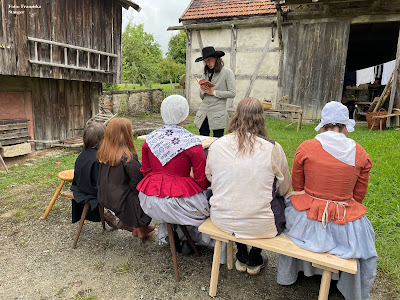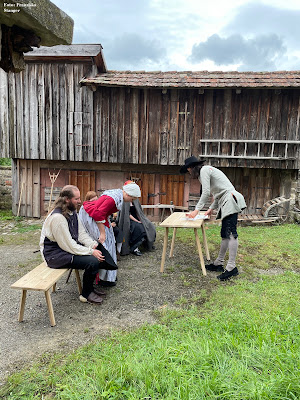Wie zufällig bin ich darauf aufmerksam geworden, dass derzeit ein neuer Film in die Kinos kommt, der 1789 spielen soll. Das Thema, dass die französische Institution des Restaurants im Jahr des Bastillesturms gegründet worden sein soll, machte mich erstmal stutzig. Aber mir war auch bewusst, dass in letzter Zeit einige französische Kinofilme erschienen waren, die sich gelohnt hatten und im 18. Jahrhundert spielten (wie "L'echange des princesses" (2017) oder "Mademoiselle de la Joncquières" (2018)). Doch erst einmal zur Handlung.
Am Beginn des Films, der 1788 einsteigen soll, begegnen wir dem Koch Manceron (Grégory Gadebois), der für den Duc de Chamfort (Benjamin Lavernhe) die Schlossküche führt. Als er sich aber über die Anordnung des Herzogs hinwegsetzt und eine neue Kreation mit Kartoffeln und Trüffeln, genannt Délicieux [1], auf die Tafel des Herzogs bringen lässt, wird der Herzog zum Spott der Höflinge, deren Gunst der Herzog zu benötigen scheint um in Versailles Einfluss zu bekommen. Statt sich für seine Tat vor dem Herzog zu entschuldigen, verlässt der vollbärtige Sonderling das Schloss zusammen mit seinem Sohn Benjamin (Lorenzo Lefèbvre) und wanderte zu seinem Vaterhaus von wo er vor Jahren aufgebrochen war. Bald findet sich Louise (Isabelle Carré) ein, welche trotz ihres Alters bei Manceron in die Lehre gehen will. Nachdem sich Manceron nicht nur vom Herzog genarrt fühlt, stellt er sein Wirtshaus so um, dass es à la carte Gerichte anbietet und eher wie ein modernes Restaurant geführt wird. Es ist nun 1789 und viele Menschen sind nun bereit für das neue Konzept. Auch werden die Armen aus der Gegend schon als ein Linienbataillon am Wirtshaus Station macht, eingestellt. Louise hat allerdings noch eine Rechnung mit dem Duc zu begleichen, der Manceron als "Steuern" große Teile seiner Einnahmen durch seinen Intendanten (Guillaume de Tonquédec) einsacken lässt [2]. Als Manceron alle Geheimnisse seines weiblichen Lehrlings kennt und begreift, dass ihn der Duc immer wieder hintergangen hat, begreift er wie er sich und Louise an ihm würdevoll rächen kann. Wenige Tage später fällt die Bastille ...
As if by chance, I became aware of the fact that a new film is currently coming into the cinemas, which is supposed to play in 1789. The topic that the French institution of the restaurant should have been founded in the year of the Bastille storm first made me puzzled. But I was also aware that there had been a few French movies recently that had paid off and were set in the 18th century (such as "L'echange des princesses" (2017) or "Mademoiselle de la Joncquières" (2018)). But first to the plot.
At the beginning of the film, which should start in 1788, we meet the cook Manceron (Grégory Gadebois), who runs the castle kitchen for the Duc de Chamfort (Benjamin Lavernhe). But when he disregards the Duke's order and has a new creation with potatoes and truffles, called Délicieux [1], put on the Duke's table, the Duke becomes the mockery of the courtiers, whose favor the Duke seems to need to in Get Versailles Influence. Instead of apologizing to the duke for what he did, the bearded nerd leaves the castle with his son Benjamin (Lorenzo Lefèbvre) and wandered to his father's house from where he left years ago. Louise (Isabelle Carré) soon turns up and, despite her age, wants to do an apprenticeship at Manceron. After Manceron felt fooled not only by the Duke, he converted his inn so that it offered à la carte dishes and was run more like a modern restaurant. It is now 1789 and many people are now ready for the new concept. The poor from the area are also hired when a line battalion stops at the inn. Louise, however, still has a bill to settle with the Duc, who lets Manceron sack large parts of his income as "taxes" through his director (Guillaume de Tonquédec) [2]. When Manceron knows all the secrets of his female apprentice and understands that the Duc has betrayed him again and again, he understands how he and Louise can take revenge on him with dignity. A few days later the Bastille falls ...
1789 ist ein Epochenjahr, welches gerne in Frankreich als Handlungszeit großer Kinofilme diente ("Le chevalier à la rose rouge" (1966), "Les adieus à la reine" (2012)). Hier dient das Jahr als eine Art Folie für einen Koch-Feel-Good-Movie.












